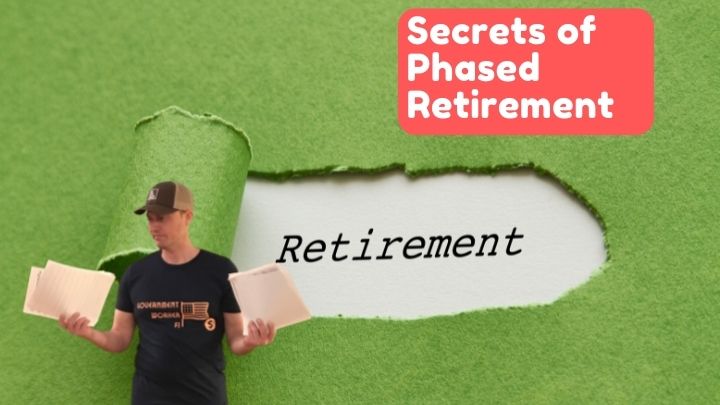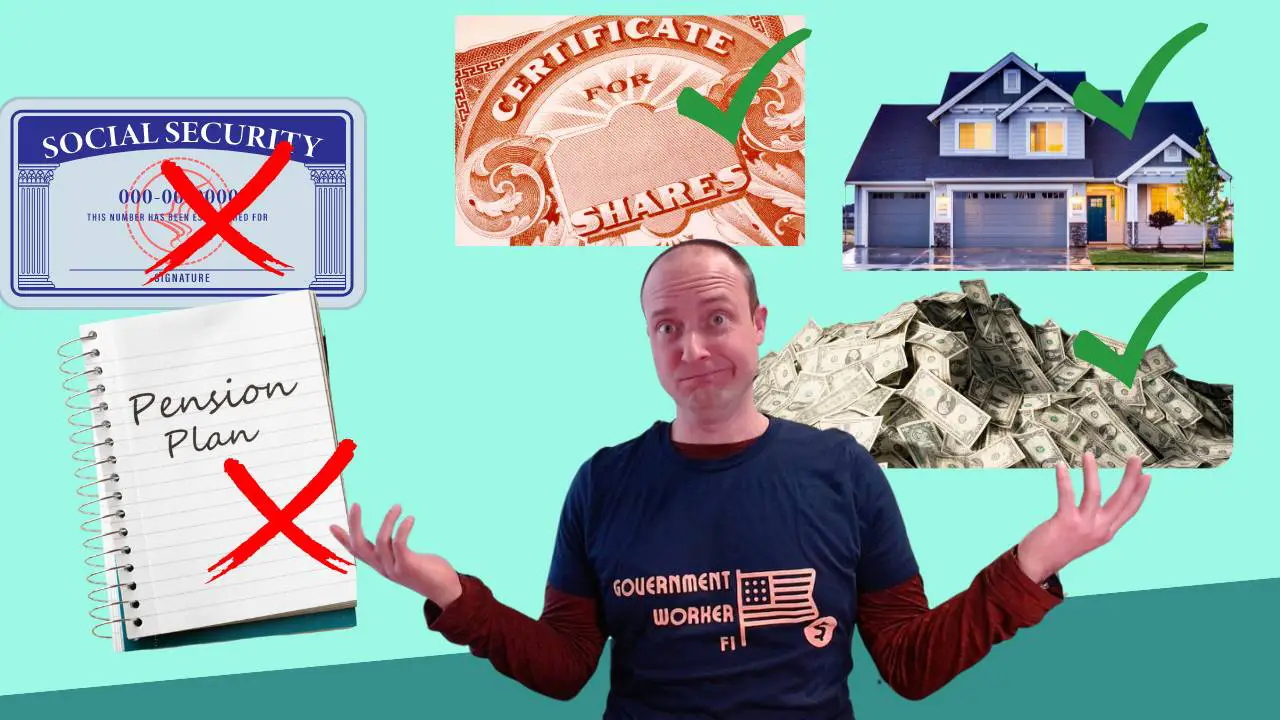Are you a federal employee looking to retire or a recent retiree?
Congratulations!
Now that you’re not tied to a specific work location, you have the freedom to move anywhere in the country. (Or anywhere in the world for that matter.)
If you are a federal retiree (or soon to be retiree) you’ll want to think about which states are best for you. You will need to consider how your retirement funds will be taxed and what the quality of life is like in each state. In this article I discuss the factors you need to consider before making a move. Finally, I create a list of states that may offer the best options for retiring federal employees.
Get Gov Worker’s top 4 tips for federal employees!Table of Contents
- Best states for federal retirees with a low cost of living
- Taxes
- Non-financial factors for choosing a retirement state
- Thinking outside the box: best non-states for federal retirees
- Summary
Please do not confuse my personal blog for financial advice, tax advice or an official position of the U.S. Government. This post may contain affiliate links. If you make a purchase after clicking on a link, I get a small percentage of the sale at no additional cost to you.
Best states for federal retirees with a low cost of living
One of the biggest considerations about where to live in retirement is the cost of living. Hopefully if you’re one of my loyal readers, you have made smart money moves throughout your government career and have enough money between your TSP, FERS annuity, and social security to retire anywhere you want to.
On the other hand, if you only have a small pension, moving to a state with a lower cost of living is an excellent option.
This website ranks the cost of living in different states. The top 5 lowest cost of living states are:
- Mississippi
- Oklahoma
- Arkansas
- Kansas
- Missouri
Of course, the cost of living varies a lot within states too. We live downtown where we can both walk to work. If we were retired, we could move out of the city and into a house that cost less than a third of our current house.
Ultimately, whether it makes sense to move to a low cost of living state depends the cost of living of your current state and how much you could save. While a general lists of states can help you brainstorm ideas, you will need to get more granular data about specific locations to see just how your own personal expenses may change.
Taxes
The tax rates in your state can have a big impact on your retirement. While federal taxes on pensions are the same no matter where you live, all states have different tax laws.
Some states have no income tax but a higher sales tax. Similarly, some states have no sales tax but do tax income. Other states, like Illinois, have an income tax but exclude retirement income.
States with no income tax
The following states do not tax income. In addition, these states do not tax capital gains (with the exception of New Hampshire). This makes them ideal states for federal retirees who will have a pension.
- Alaska
- Florida
- Nevada
- New Hampshire
- South Dakota
- Tennessee
- Texas
- Washington
- Wyoming
States with income tax that do not tax pensions
In addition, 3 more states will not tax pensions or withdraws from IRAs/TSP:
- Illinois
- Pennsylvania
- Mississippi
Tax on social security benefits
According to MarketWatch, 38 states don’t tax social security income at all. (West Virginia just changed their tax code to exclude social security). Of the 12 states that do tax social security income, many of them include some provisions for excluding a portion of the social security income.
The following 12 states tax at least a portion of social security income:
- Colorado
- Connecticut
- Kansas
- Minnesota
- Missouri
- Montana
- Nebraska
- New Mexico
- North Dakota
- Rhode Island
- Utah
- Vermont
States with no sales tax
If you’re a federal employee, you will likely have income in retirement from your FERS pension, social security, and TSP withdrawals.
However, if you retire early, you have options on when you create taxable income. For instance, if you converted your TSP to a Roth IRA you could be in the zero percent tax bracket later in retirement.
For these early federal retirees, the best state might be one that does not have sales tax. Five states do not impose a sales tax:
- Alaska
- Delaware
- Montana
- New Hampshire
- Oregon.
Property taxes
If you are trying to minimize taxes in retirement, you’ll also want to consider property taxes. In most cases, municipalities determine the property taxes. However, Wallethub has a nice ranking of the average property taxes by state. The five lowest states are:
- Hawaii
- Alabama
- Colorado
- Louisiana
- District of Columbia
I want to point out that 4 of these states have a very high cost of living! While the property tax rates may be low, the houses are expensive so the total tax is high.
In short, while property taxes may represent a major expense, they cannot be considered in a vacuum.
Summary of state taxes for federal employees
When I wrote about federal taxes and retirement, I pointed out that you shouldn’t focus on minimizing taxes. Instead, it was important to maximize post-tax income. Sometimes you have to pay more taxes but end up with more money. You will want to apply a similar framework for deciding where to retire- taxes shouldn’t determine where you choose to live, it is the cost of living you can buy with your post tax dollars that matters.
For example it is worth noting that both Alaska and New Hampshire have no income or sales taxes. However, you will likely pay some tax: Alaska municipalities may levy a sales tax and New Hampshire imposes a capital gains tax. While these might be the most tax advantaged states for federal retirees, that doesn’t make them the best. Both of these states are above the median in terms of the cost of living. While you may save money on taxes by living in these states, your tax savings may be erased by the higher cost of living.
Non-financial factors for choosing a retirement state
Family
I think it’s a good exercise to understand which are the best states for federal retirees from a financial standpoint. However, many location-independent people (especially retirees) want to live near family. If all of your grandchildren are living in a high cost of living/high tax state like California, you might choose to live there regardless of the higher costs.
Climate
Different climates suit different people better so take this into consideration when making decisions about where to retire. For instance, do you love the snow? Then you’re probably not going to want to move into a retirement community in Florida. Since climate can be subjective, I can’t think of any way to rank the states with the best climate for federal retirees. (Although I’m sure we can scratch North Dakota and Mississippi off the list).
Services
Finally, when ranking the best states for federal retirees, it’s important to take into account what sorts of services and recreational activities are available in your retirement location. Are you hours away from the nearest hospital? Does your city have free concerts in the park for seniors? What is the crime rate in your area? Everyone will have different goals for what they want in their retirement location, so consider these factors when making a decision.
Thinking outside the box: best non-states for federal retirees
The “two-state solution” for federal retirees
I know quite a few retirees where I live who call themselves “snow birds”. They spend most of the year living in the Midwest and then spend their winters living in Florida or Arizona.
Recently, I too have been thinking seriously about being a snow bird when I retire (or retire early). Every winter I curse the cold and darkness. I am happiest when I get outside for at least an hour a day. The weather in January and February makes this nearly impossible (<10°F).
On the other hand, I can’t really imagine surviving summer in Louisiana or Mississippi either. My body doesn’t handle hot and humid well.
So if my retirement life goal were to spend an hour or more outside every day then I don’t have a lot of options. I could live somewhere like San Diego or Portland or Seattle (sooooo expensive compared to the Midwest). Or I could spend April-October here and spend the remainder of the year somewhere warmer.
Depending on your other requirements, you could spend 6 months + 1 day in a low tax state and work this tax minimization into your retirement strategy.
The only down-side I see with this strategy is cost. Do you need to own two properties? Can you rent one out during the off-season, perhaps as an Airbnb? Or would you be completely nomadic?
While I don’t have all of the answers, I am sure another FIRE blogger has an optimized plan to be a snow bird. It’s fun for me to think and dream about if nothing else.
Is the best state for federal retirees not a state?
Finally, what if the best state for federal retirees was not a state but another country? I really enjoy playing with this cost of living calculator that I found on a Mr. Money Mustache article about the best places to live.
If you are willing to move outside of the United States, you could find a city with the climate of San Diego with the cost of living of Des Moines, Iowa. Seems like that could be a fun adventure for the first decade (or more) of retirement.
Summary
In this article, I tried to provide a lot of information about which states might be the best for federal retirees. While I found data on the cost and tax implications of various states, I don’t think there is one right answer. If you’re a federal employee who has this all figured out, Tweet at me or send me an email so I can learn from you.
Get Gov Worker’s top 4 tips for federal employees!



